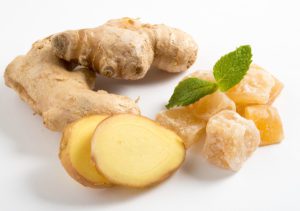Natural Medicine Tip
Daily intake of baby aspirin is commonly recommended to help prevent heart disease and even reduce the risk of cancer. Although aspirin is one of the safest over-the-counter drugs, it still has potential side effects such as GI bleeding, ulcers, kidney and liver damage, tinnitus, and even hemorrhagic stroke if utilized too much. If you are concerned about the side effects of aspirin or if you are aspirin sensitive, you may want to consider the common spice, ginger, as a healthy alternative.
Ginger is derived from a perennial plant that bears narrow green leaves and yellow flowers. Although many people think of the therapeutic effect of ginger being related to treating an upset stomach, it actually has several other therapeutic effects. Ginger’s therapeutic benefits are derived primarily from its content of antioxidants. In fact, ginger contains at least 12 types of antioxidants more powerful than vitamin E.1 Antioxidants combat harmful free radicals in the body by reducing oxidation that can inflame the lining of arteries. There are various antioxidants in Ginger known as flavonoids that are very good for cardiac health.
Two research studies that were conducted on the impact of flavonoids and ginger on heart health are worthy of mention. One study looked at the dietary flavonoid intake of 1,400 men. Researchers found that the men in this study who got the least amount of flavonoids exhibited the worst carotid artery diameter and demonstrated the highest risk of heart disease.2 In another study, researchers divided 40 participants into two groups. One group was classified as healthy and the other group was classified with a history of coronary artery disease. Members of both groups received 5 grams of ginger powder each day or a placebo. After only four weeks, those receiving ginger powder demonstrated a significantly greater reduction of harmful oxidation than those taking the placebo by as much as 18% in the healthy group and 23% in the heart disease group.3
So how does ginger affect the body like aspirin? Like aspirin, ginger works as a blood thinner which can prevent the formation of clots that can lead to heart attack or stroke. Ginger also reduces inflammation in the same way as aspirin by blocking COX-2 — the enzyme that promotes inflammation.4 This is very beneficial since it is inflammation that leads to heart disease and other chronic illnesses (including cancer).
So what is the best way to take ginger? Ginger, of course, can be used in cooking as a spice by using fresh ginger root or by drinking ginger tea*. If you prefer to take a ginger supplement, take it in a capsule or pill that contains 5% gingerols with a recommended dose of 100 mg per day.5 Ginger supplements can be purchased online, in some drug stores, and in most health food stores.
* Home Ginger Tea remedy:
- Boil 4 cups of water in a saucepan.
- Peel a 2-inch piece of fresh ginger root and slice it into thin slices.
- Add the ginger to the boiling water.
- Cover it, reduce the heat, and let it simmer for 15-20 minutes.
- Strain the tea. Add honey and lemon to taste… and enjoy!
If your medical physician has prescribed daily baby aspirin intake, do not stop taking baby aspirin in in lieu of ginger without consulting him or her first. If baby aspirin has not been prescribed for you but you are taking it proactively, you may consider taking ginger daily as an alternative. That being said, please realize that although ginger is a natural plant substance and considered safe, it can thin your blood and slow clotting time. Therefore, you should always talk to your doctor before taking ginger, especially if you are already taking baby aspirin, taking any blood-thinning medications, or have a bleeding disorder.
References:
-
- Kikuzaki H and Nakatani N. “Antioxidant Effects of Some Ginger Constituents.” Journal of Food Science. 2006;Volume 58 Issue 6, Pages 1407 – 1410.
- Mursu J et al (2007) The intake of flavonoids and carotid atherosclerosis: the Kuopio Ischaemic Heart Disease Risk Factor Study. British Journal of Nutrition, Apr 30, 1-5
- Verma, SK et al. “Antioxidant property of ginger in patients with coronary artery disease.” South Asian J Prev Cardiology. 2004;8(4).
- Dugasani S, et al. “Comparative antioxidant . . .effects of [6]-gingerol, [8]-gingerol, [10]-gingerol and [6]-shogaol.” J Ethnopharmacol. 2010;127(2):515-20.
- Sears Health Newsletter by Al Sears, MD, CNS

